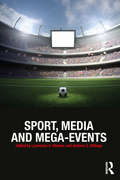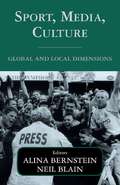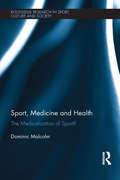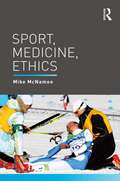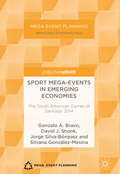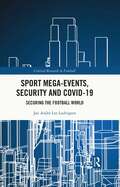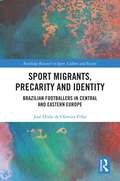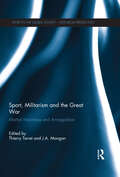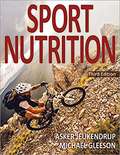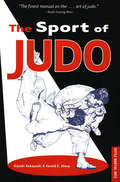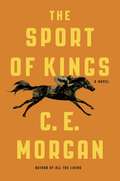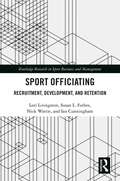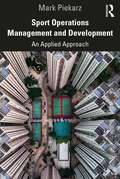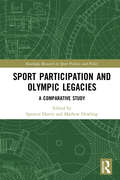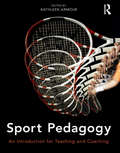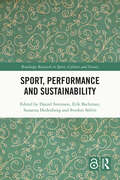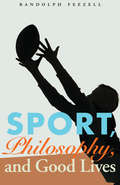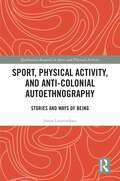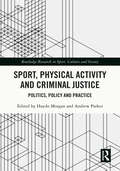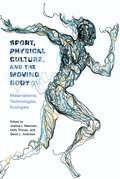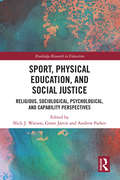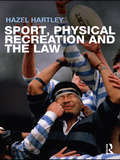- Table View
- List View
Sport, Media and Mega-Events
by Lawrence A. Wenner and Andrew C. BillingsBringing together many of the most influential scholars in sport and media studies, this book examines the diverse ways that media influences our understanding of the world’s most important sport events, dubbed sports mega-events. It sheds new light on how these events have been changed by the media, and have, in turn, adapted to media to further their brand’s cultural influence. Focusing on the central concept of "mediatization" – the permeation of media into all spheres of contemporary life – the book presents original case studies of major events including the Olympics, FIFA, rugby and cricket World Cups, Tour de France, Super Bowl, World Series, Monaco Grand Prix, Wimbledon, and many more. Written from a truly international perspective, this is a seminal work in sport and media studies that reveals the growing political, economic, and cultural influences of sport mega-events in contemporary society. Sport, Media and Mega-Events is an essential text for any course on the sociology of sport, event management, sport marketing, or featuring a cultural, communication or media studies approach to sport.
Sport, Media, Culture: Global and Local Dimensions (Sport in the Global Society #No. 36)
by Alina Bernstein Neil BlainAn examination of the central features of the sport-media phenomenon, focusing on Europe and the USA. The book analyses such issues as new media technology; gender, ethnicity and local dimensions of collective identity; women in American basketball advertising; and cult football radio in Scotland.
Sport, Medicine and Health: The medicalization of sport? (Routledge Research in Sport, Culture and Society)
by Dominic MalcolmThe relationship between sport, medicine and health in our society is becoming increasingly complex. This important and timely study explores this relationship through an analysis of changing political economies, altered perceptions of the body and science’s developing contribution to the human condition. Surveying the various ways in which medicine interacts with the world of sport, it examines the changing practices and purposes of sports medicine today. Drawing on the latest research in the sociology of sport, this book investigates the scientific discourse underlying the promotion of physical activity to reveal the political context in which medical knowledge and public policies emerge. It considers the incongruities between these policies and their attempts to regulate the supply of and demand for sports medicine. Through a series of original case studies, this book exposes the social construction of sports medical knowledge and questions the potential for medicine to influence athletes’ well-being both positively and negatively. Sport, Medicine and Health: The medicalization of sport? provides valuable insights for all students and scholars interested in sports medicine, sports policy, public health and the sociology of sport.
Sport, Medicine, Ethics
by Mike McNameeThe ethics of sports medicine is an important emerging area within biomedical ethics. The professionalization of medical support services in sport and continuing debates around issues such as performance-enhancing technologies or the health and welfare of athletes mean that all practitioners in sport, as well as researchers with an interest in sports ethics, need to develop a clear understanding of the ethical aspects of the sport–medicine nexus. This timely collection of articles explores the conceptual and practical issues that shape and define ethics in sports medicine. Examining central topics such as consent, confidentiality, pain, doping and genetic technology, this book establishes an important baseline for future academic and professional work in this area.
Sport Mega-Events in Emerging Economies: The South American Games of Santiago 2014 (Mega Event Planning)
by Silvana González-Mesina Jorge Silva-Bórquez David J. Shonk Gonzalo A. BravoChile and the South American Games of Santiago 2014 offers an interesting case to examine an event of sizeable magnitude in a country with little history of hosting sport mega-events (SMEs). This case study will expand the readers understanding of third-order SMEs like the South American Games and highlight the circumstances under which they occur. It also contributes to advance and challenge our knowledge as to what extent previous findings made on impact, legacies, justifications, and challenges identified on larger scale SMEs hosted in the developed world, inform the process and outcomes of second or third-order SMEs organized in less developed countries. This monograph is suitable for scholars and practitioners who want to expand their knowledge on sport event planning outside the rim of the global north. It is an essential read for scholars and graduate students in policy studies, sociology, international business, sport and event management, and tourism and hospitality. Likewise, it is an important resource for event planners, government officials, event rights holders, and sport destination marketers involved with the planning of sport mega-events across the world.
Sport Mega-Events, Security and COVID-19: Securing the Football World (Critical Research in Football)
by Jan Andre LudvigsenThis book examines contemporary issues of security at sports mega-events (SMEs). It focuses on the 2020 UEFA European Football Championship (Euro 2020) - subsequently postponed to 2021 - the third biggest SME in the global sporting calendar and a unique multi-city, multi-country event that took place in the eye of the COVID-19 storm. Drawing on stakeholder interviews, policy documents, media sources and existing research, the book explores the constructions, meanings, and perceptions of security in the efforts to secure this football mega-event. It argues that Euro 2020 is a powerful case through which to better understand wider security governance and security-related processes in present-day societies, which are increasingly preoccupied with notions of ‘security’, ‘safety’ and ‘risk’. It assesses the precautionary logic and transnational knowledge transfer processes that guide security constructions surrounding SMEs in an uncertain and threat-conscious world, and captures the dramatic moments in which COVID-19 transitioned into a security threat with severe impacts on the world of football and well beyond. Sport Mega-Events, Security and COVID-19 advances existing debates in the sociology of football and sport, offering a critical understanding of security and safety in the modern world, and giving an insight into the changing ‘new normalities’ of security between 9/11 and the COVID-19 pandemic through the lens of global sport. This is a fascinating reading for anybody with a professional or academic interest in sport management, event management, football, security studies, policing, risk and crisis management, the sociology of sport, the sociology of surveillance, or political science.
Sport Migrants, Precarity and Identity: Brazilian Footballers in Central and Eastern Europe (Routledge Research in Sport, Culture and Society)
by José Hildo de Oliveira FilhoThis book takes a close look at the experiences of migrant athletes, their precarious careers, and at what this can tell us about wider themes of globalisation, identity, race, gender, and the body.Based on in-depth ethnographic research on male Brazilian footballers and futsal players working in Central and Eastern Europe, this book helps to fill gaps in previous research on sports migration and global sports labor markets. This book uses life-history interviews to reveal how race, gender, and class are articulated in the everyday experiences of migrant athletes; how they express their religious affiliations; and how they navigate the relationships with injuries and pain that are characteristic of precarious athletic careers. This book considers the transnational networks that are essential in sustaining international athletic labor flows and the role that borders and emotions play in the lives of sports migrants and also the agency that migrant athletes can have in issues such as player development and retention.Presenting a more nuanced, ground-level perspective on sports migration and the sociological dialogue between identity, culture, and the body, this book is fascinating reading for anybody with an interest in the socio-cultural study of sport, migration, globalization, or global inequalities.
Sport, Militarism and the Great War: Martial Manliness and Armageddon (Sport in the Global Society - Historical Perspectives)
by Thierry Terret J. A. ManganThe Great War has been largely ignored by historians of sport. However sport was an integral part of cultural conditioning into both physiological and psychological military efficiency in the decades leading up to it. It is time to acknowledge that the Great War also had an influence on sport in post-war European culture. Both are neglected topics.Sport, Militarism and the Great War deals with four significant aspects of the relationship between sport and war before, during and immediately after the 1914-1918 conflict. First, it explores the creation and consolidation of the cult of martial heroism and chivalric self-sacrifice in the pre-war era. Second, it examines the consequences of the mingling of soldiers from various nations on later sport. Third, it considers the role of the Great War in the transformation of the leisure of the masses. Finally, it examines the links between war, sport and male socialisation. The Great War contributed to a redefinition of European masculinity in the post-war period. The part sport played in this redefinition receives attention.Sport, Militarism and the Great War is in two parts: the Continental (Part I) and the "Anglo-Saxon" (Part II). No study has adopted this bilateral approach to date. Thus, in conception and execution, it is original.With its originality of content and the approaching centenary of the advent of the Great War in 2014, it is anticipated that the book will capture a wide audience.This book was originally published as a special issue of The International Journal of the History of Sport.
Sport Nutrition
by Asker Jeukendrup Michael Gleeson<p>Sport Nutrition, Third Edition, presents the principles and rationale for current nutrition guidelines for athletes. Using a physiological basis, this text provides an in-depth look at the science behind sport nutrition. Students will come away with an understanding of nutrition as it relates to sport and the influence of nutrition on performance, training, and recovery. <p>This text is organized with the student in mind, with content sequenced in a logical order that puts building blocks in place to facilitate greater comprehension as more advanced topics are introduced. The book moves from general principles of nutrition and nutrient requirements to estimating and fulfilling energy needs with the appropriate combinations of macronutrients and micronutrients. Supplements are addressed from a scientific standpoint, followed by the influence of nutrition on training adaptations, immune function, body composition, weight management, and eating disorders. The new chapter on personalized nutrition covers periodized nutrition, gender differences, and special populations (young athletes, older athletes, and diabetic athletes) and offers practical examples from specific sports. </p>
Sport Nutrition for Coaches
by Leslie BonciSport Nutrition for Coaches is a complete resource for coaches looking to ensure that athletes achieve optimal performance through proper nutrition. <p><p>In its practical and easy-to-understand format, this text supplies coaches, personal trainers, and fitness specialists with a wide range of information, including balancing nutrients, monitoring supplement use, and dealing with disordered eating. This book also contains several planning tools that can help readers to put the information and strategies to use. As one of only two nutrition books on the market geared toward coaches, this is a valuable resource for people working with athletes.
The Sport of Judo
by Harold E. Sharp Kiyoshi KobayashiJudo, the "gentle way" based on an ancient Japanese jujutsu and now a premier modern Olympic sport, is systematically presented in The Sport of Judo. This volume, an invaluable resource for any beginning judoka or teacher, comprises a point-by-point demonstration and explanation of over fifty essential techniques, as practiced at the international home of judo, the Kodokan Institute in Tokyo. In addition, The Sport of Judo includes a brief history of development and spread of judo, as well as a discussion of judo competition, including Kodokan contest rules, and a complete glossary of terms.
The Sport of Judo
by Harold E. Sharp Kiyoshi KobayashiJudo, the "gentle way" based on an ancient Japanese jujutsu and now a premier modern Olympic sport, is systematically presented in The Sport of Judo. This volume, an invaluable resource for any beginning judoka or teacher, comprises a point-by-point demonstration and explanation of over fifty essential techniques, as practiced at the international home of judo, the Kodokan Institute in Tokyo. In addition, The Sport of Judo includes a brief history of development and spread of judo, as well as a discussion of judo competition, including Kodokan contest rules, and a complete glossary of terms.
The Sport of Kings
by C. E. MorganHailed by The New Yorker for its “remarkable achievements,” The Sport of Kings is an American tale centered on a horse and two families: one white, a Southern dynasty whose forefathers were among the founders of Kentucky; the other African-American, the descendants of their slaves. <P><P> It is a dauntless narrative that stretches from the fields of the Virginia piedmont to the abundant pastures of the Bluegrass, and across the dark waters of the Ohio River; from the final shots of the Revolutionary War to the resounding clang of the starting bell at Churchill Downs. As C. E. Morgan unspools a fabric of shared histories, past and present converge in a Thoroughbred named Hellsmouth, heir to Secretariat and a contender for the Triple Crown. Newly confronted with one another in the quest for victory, the two families must face the consequences of their ambitions, as each is driven---and haunted---by the same, enduring question: How far away from your father can you run? <P><P> A sweeping narrative of wealth and poverty, racism and rage, The Sport of Kings is an unflinching portrait of lives cast in the shadow of slavery and a moral epic for our time.
The Sport of Queens: The Autobiography of Dick Francis
by Dick FrancisDick Francis is one of the best horsemen in England. He is also a suspense novelist. "A fine mystery writer-perhaps one of the best in the English language," says a reviewer in the Thoroughbred Record. "Dick Francis turns out to be a writer of champion class," says the London Times. "Mr. Francis is not only a very fine writer, but he is an authority on aspects of the thoroughbred scene," says Bing Crosby. Dick Francis (Welshman, ex-jockey, now Racing Editor of London's Sunday Express), author of such popular novels as Blood Sport and Flying Finish, talks about his early life in this informative, beguiling book which will fascinate racing fans and horse lovers and will be of great interest to the readers of his fiction. "I learned to ride, when I was five, on a donkey," says Dick Francis. He learned on his grandfather's farm in Pembrokeshire. His grandfather, Willie Thomas, "was a great man in the Victorian tradition. I remember him as a tall man and certainly he was a popular man. Nearly all our food came from the farm itself. Butter and cheese were made in the dairy and twice a week the great kitchen would be filled with the unique warm-winey smell of bread baking Although the smells and warmth of the kitchen were enticing, the stables drew me most. My grandfather rode to hounds regularly two or three days a week, and he was justly proud of his hunters which he used to breed with great care and success." During most of Dick Francis' childhood his father was the manager of W J. Smith's Hunting Stables and many of the Royal Family were among his father's pupils and patrons. Young Dick Francis had the opportunity to ride every sort of pony. Soon his father was asking his advice about horses and Dick was winning prizes as the "Best Boy Rider." He tells how he worked toward becoming a jockey, and describes vividly the day- to-day perils and pleasures of life as a steeplechase jockey. He talks about his war years with the R.A.F., compares American and English racing and gives firsthand information about many of the world's most famous tracks and famous horse owners. It all added up to an exciting life, and he shares it with his readers-up to the fatal moment when, leading the field in the 1956 Grand National, his horse, the Queen Mother's Devon Loch, fell mysteriously a breath away from the winning post.
Sport Officiating: Recruitment, Development, and Retention (Routledge Research in Sport Business and Management)
by Lori Livingston Susan L. Forbes Nick Wattie Ian CunninghamSport officials are tasked with maintaining order and adjudicating sport contests. Given their multifaceted role in enforcing rules, standardizing competitions, and keeping sport safe for all participants, they are a requisite part of the sport workforce. With ongoing reports of annual attrition rates in officiating in excess of 20-35% for various sports around the world, there is more than ample evidence that officiating dropout is a persistent, pervasive, and global challenge underpinned by multiple contributing factors including, but not limited to, the threat of verbal and physical abuse. Moreover, despite worldwide recognition and growing interest in the problem, there has not been a comprehensive resource for sport scientists and practitioners studying or working to reverse the ongoing trend. Sport Officiating: Recruitment, Development, and Retention provides a ‘state of the science’ summary in the emerging area of inquiry limited to sport officiating recruitment, development, and retention, and, provides insight and evidence-based approaches to the development of successful officiating development programs (ODP). This book is a primary reference work using a multifaceted, holistic, and evidence-based approach to integrate key findings from the sport science literature to date in suggesting and providing real-world solutions to the practical issues faced by sport organizers. Sport Officiating: Recruitment, Development, and Retention is a key resource for researchers interested in the development of sport officials and for sport practitioners aiming to implement officiating development programs (ODP) at any level within sport systems.
Sport Operations Management and Development: An Applied Approach
by Mark PiekarzThis essential textbook introduces the work of sport management and sport development from the perspective of the day-to-day operational challenges faced by managers and sport development officers. It addresses the practicalities of designing and delivering sport services safely, efficiently and effectively, for profit or in non-profit contexts. The book covers core topics such as time management, project management, customer care, developing partnerships, fundraising, crisis management and research. It adopts a problem-based learning approach, with a strong, practical focus on putting theory into practice, to illustrate good practice and to help the reader develop sound operational skills, knowledge and decision-making, underpinned by the principles of safety, effectiveness and efficiency. It features a range of diverse international case studies, covering different sports and operational management challenges, including global pandemics and terrorism. Connecting theories, ideas and scientific disciplines, the book helps managers approach operations management more creatively, combining both management and development work to show areas of difference and overlap. It also introduces systems theory and the principals of marginal gains or small wins, to help managers develop working cultures which can be utilised in all areas of management, encouraging a culture of learning, reflection and ethical action. Sport Operations Management and Development is designed for both practitioners and students working in sport management, development, coaching or aspects of sport science.
Sport Participation and Olympic Legacies: A Comparative Study (Routledge Research in Sport Politics and Policy)
by Spencer Harris; Mathew DowlingThis book examines claims that the Olympic Games are a vehicle to inspire and increase mass sport participation. It focuses on the mass sport participation legacy of the most recent hosts of the summer Olympics, including Atlanta, Sydney, Athens, Beijing, London, Rio, and Tokyo. It is organised by host city/country and applies an analytical framework to each, addressing the socio-political context that shapes sport policy, the key changes in sport policy, the structure and governance of community sport, the Olympic and Paralympic legacy, and the changes in mass sport participation before, during, and after the Games. The book is important reading for students, researchers, and policymakers working in sport governance, sport development or management, and the sport policy sector.
Sport Pedagogy: An Introduction for Teaching and Coaching
by Kathleen ArmourSport Pedagogy offers an essential starting point for anyone who cares about sport, education and young people. It offers invaluable theoretical and practical guidance for studying to become an effective teacher or coach, and for anyone who wants to inspire children and young people to engage in and enjoy sport for life. The book also focuses on you as a learner in sport, prompting you to reflect critically on the ways in which your early learning experiences might affect your ability to diagnose the learning needs of young people with very different needs. Sport Pedagogy is about learning in practice. It refers both the ways in which children and young people learn and the pedagogical knowledge and skills that teachers and coaches need to support them to learn effectively. Sport pedagogy is the study of the place where sport and education come together. The study of sport pedagogy has three complex dimensions that interact to form each pedagogical encounter: Knowledge in context - what is regarded as essential or valuable knowledge to be taught, coached or learnt is contingent upon historical, social and political contextual factors that define practice; Learners and learning -at the core of sport pedagogy is expertise in complex learning theories, and a deep understanding of diversity and its many impacts on the ways in which young learners can learn; Teachers/teaching and coaches/coaching - effective teachers and coaches are lifelong learners who can harness the power of sport for diverse children and young people. Gaining knowledge and understanding of the three dimensional concept of sport pedagogy is the first step towards ensuring that the rights of large numbers of children and young people to effective learning experiences in and through sport are not denied. The book is organised into three sections: background and context; young people as diverse learners; the professional responsibility of teachers and coaches. Features of each chapter include:research extracts, 'comments' to summarise key points, individual and group learning tasks, suggested resources for further reading, and reference lists to enable you to follow-up points of interest. This book provides you with some of the prior knowledge you need to make best use of teaching materials, coaching manuals and other resources. In so doing you, as a teacher or coach, will be well placed to offer an effective and professional learning service to children and young people in sport.
Sport, Performance and Sustainability (Routledge Research in Sport, Culture and Society)
by Daniel Svensson Erik Backman Susanna Hedenborg Sverker SörlinThis book examines the logic of ‘faster, higher, and stronger’ and the technoscientific revolution that has driven tremendous growth in the sports economy and in sport performance over the last 100 years. It asks whether this logic needs revisiting in the light of the climate crisis and sport’s environmental responsibilities. Drawing on multi-disciplinary work in sport history, sport pedagogy, sport philosophy, sport science, and environmental history, the book considers not only how sportification may have contributed to the growing environmental impact of sport but also whether it might be used as a tool of positive social change. It reflects on the ways that sport sets performance limits for other ethical reasons, such as doping controls, and asks whether sport could or should set limits for environmental reasons too. Sport, Performance and Sustainability touches on key themes in sport studies, including digitisation, activism, social media, empowerment, youth sport, and physical education. This is fascinating reading for anybody with an interest in sport, the environment, development, sociology, or culture. Daniel Svensson is an Associate Senior Lecturer in Sport Management at the Department of Sport Sciences, Malmö University, Sweden. He has written several book chapters and articles about the relationship between sport, science, technology, and the environment. Erik Backman is an Associate Professor and Senior Lecturer in Pedagogy and Sport Sciences at the Department of Sport Sciences, School of Health and Welfare, Dalarna University, Sweden, and Associate Professor at the Department of Primary and Secondary Teacher Education, Faculty of Education and International Studies, Oslo Metropolitan University, Norway. His main research interest is in outdoor education, physical education, and sport pedagogy. Susanna Hedenborg is a Full Professor in Sport Sciences at Malmö University, Sweden, and the President of the Swedish Research Council for Sport Science. Hedenborg has a background in social and economic history and her sport research has focused on gender issues, children and youth sport, and equestrian sports. Sverker Sörlin is a Professor of Environmental History in the Division of History of Science, Technology and Environment, KTH Royal Institute of Technology, Sweden, and a co-founder of the KTH Environmental Humanities Laboratory. His research is on the role of knowledge in environmentally informed modern societies and in research and innovation policies. Current research interests include the history of environmental climate governance.
Sport, Philosophy, and Good Lives
by Randolph FeezellThere&’s more to sports than the ethos of competition, entertainment, and commercialism expressed in popular media and discourse. Sport, Philosophy, and Good Lives discusses sport in the context of several traditional philosophical questions, including: What is a good human life and how does sport factor into it? To whom do we look for ethical guidance? What makes human activities or projects meaningful? Randolph Feezell examines these questions along with other relevant topics in the philosophy of sport such as the contribution of play to a meaningful life, the various reasons for pessimistic views of sport, the various claims that celebrated athletes are role models, and the seldom-questioned view that coaches are in a position to offer advice to athletes on how to live or on leadership skills. He also discusses the way that non-Western attitudes found in Buddhism, Taoism, and the Bhagavad Gita might be used to address the vulnerabilities of sports participants.Feezell draws from current sports issues, popular literature, and contemporary sports figures to shed light on the attraction and value of sports and examine the accompanying ethical issues.
Sport, Physical Activity, and Anti-Colonial Autoethnography: Stories and Ways of Being (Qualitative Research in Sport and Physical Activity)
by Jason LaurendeauThis book offers a brief history of how autoethnography has been employed in studies of sport and physical (in)activity to date and makes an explicit call for anti-colonial approaches - challenging scholars of physical culture to interrogate and write against the colonial assumptions at work in so many physical cultural and academic spaces. It presents examples of autoethnographic work that interrogate physical cultural practices as both produced by, and generative of, settler colonial logics and structures, including research into outdoor recreation, youth sport experiences, and sport spectatorship. It situates this work in the context of key paradigmatic issues in social scientific research, including ontology, epistemology, axiology, ethics and praxis, and looks ahead at the shape that social relations might take beyond settler-colonialism. Drawing on cutting-edge research and presenting innovative theoretical perspectives, this book is fascinating reading for anybody with an interest in physical cultural studies, sport studies, outdoor studies, sociology, cultural studies, or qualitative research methods in the social sciences.
Sport, Physical Activity and Criminal Justice: Politics, Policy and Practice (Routledge Research in Sport, Culture and Society)
by Haydn Morgan Andrew ParkerThis book explores the various ways in which participation in sport and physical activity might contribute to effective solutions within criminal justice systems. Focusing on a range of different sporting and physical activities across an array of social contexts involving both adult and youth populations, the book offers insight into the way in which sport and physical activity is interpreted by participants and practitioners, and how these interpretations relate to broader policy objectives within and across justice systems. It focuses on a series of key issues, including how sport policy (national and international) has developed in recent years in this area; how and to what extent such policy developments have impacted organisations and interventions (both custodial and non-custodial) across sport and criminal justice systems and sectors; and how participant cohorts (such as disadvantaged and/or ‘at-risk’ young people) have experienced these changes. With shifting debates around criminal justice and the need for policy and practical solutions to extend beyond tougher and longer sentencing, this book is important reading for students, researchers, and practitioners working in sport pedagogy, sport-for-development, sport and leisure management, sport coaching, physical education, criminology, youth work, youth studies, social work, and health studies.
Sport, Physical Culture, and the Moving Body: Materialisms, Technologies, Ecologies (Critical Issues in Sport and Society)
by Mary Louise Adams Kiri Baxter Douglas Booth Kyle S Bunds Michael D. Giardina Mariana Clark Simon C Darnell Samantha Frost Simone Fullagar Pirkko Markula Mary G. McDonald Jennifer Sterling Christopher McLeod Matthew G. Hawzen Richard Pringle Oliver Rick Jacob J. Bustad Samantha King Shannon Leigh Jette Katelyn Esmonde David Andrews Carolyn Pluim Gavin WeedonThe moving body—pervasively occupied by fitness activities, intense training and dieting regimes, recreational practices, and high-profile sporting mega-events—holds a vital function in contemporary society. As the body moves—as it performs, sweats, runs, and jumps—it sets in motion an intricate web of scientific rationalities, spatial arrangements, corporate imperatives, and identity politics (i.e. politics of gender, race, social class, etc.). It represents vitality in its productive and physiological capacities, it drives a complex economy of experiences and products, and it is a meaningful site of cultural identities and politics. Contributors to Sport, Physical Culture, and the Moving Body work from a simple premise: as it moves, the material body matters. Adding to the burgeoning fields of sport studies and body studies, the works featured here draw upon the traditions of feminist theory, posthumanism, actor network theory, and new materialism to reposition the physical, moving body as crucial to the cultural, political, environmental, and economic systems that it constitutes and within which is constituted. Once assembled, the book presents a study of bodies in motion—made to move in contexts where technique, performance, speed, strength, and vitality not only define the conduct therein, but provide the very reason for the body’s being within those economies and environments. In so doing, the contributors look to how the body moving for and about rational systems of science, medicine, markets, and geopolity shapes the social and material world in important and unexpected ways. In Sport, Physical Culture, and the Moving Body, contributors explore the extent to which the body, when moving about both ostensibly active body spaces (i.e., the gymnasium, the ball field, exercise laboratory, the track or running trail, the beach, or the sport stadium) and those places less often connected to physical activity (i.e. the home, the street, the classroom, the automobile), is bounded to technologies of life and living; and to the political arrangements that seek to capitalize upon such frames of biological vitality. To do so, the authors problematize the rise of active body science (i.e. kinesiology, sport and exercise sciences, performance biotechnology) and the effects these scientific interventions have on embodied, lived experience. Contributors to Sport, Physical Culture, and the Moving Body will be engaging a range of new and emerging theoretical perspectives, including new materialist, political ecology, developmental systems theory, and new material feminist approaches, to examine the actors and assemblages of movement-based material, political, and economic production. In so doing, contributors will vividly and powerfully illustrate the extent to which a focus on the fleshed body and its material conditions can bring forth new insights or ontological and epistemological innovation to the sociology of sport and physical activity. They will also explore the agency of the body as and amongst things. Such a performative materialist approach explicates how complex assemblages of sport and physical activity—bringing into association everything from muscle fibers and dietary proteins to stadium concrete or regional aquifers—are not only meaningful, but ecological. By focusing on the confluence of agentive materialities, disciplinary technologies, vibrant assemblages, speculative realities, and vital performativities, Sport, Physical Culture, and the Moving Body promises to offer a groundbreaking departure from representationalist tendencies and orthodoxies brought about by the cultural turn in sport and physical cultural studies. It brings the moving body and its physics back into focus: recentering moving flesh and bones as locus of social order, environmental change, and the global political economy.
Sport, Physical Education, and Social Justice: Religious, Sociological, Psychological, and Capability Perspectives (Routledge Research in Education)
by Nick J. Watson; Grant Jarvie; Andrew ParkerThis interdisciplinary collection explores the nexus of social justice and sport to consider how sport and physical education can serve as a unique point of commonality in an era of religious, political, economic, and cultural polarity. Originally published as a special issue of Quest, Sport, Physical Education, and Social Justice offers timely theoretical perspectives from the fields of theology, philosophy, psychology, and sociology. The volume demonstrates the multiple ways in which sport can be used to overcome inequalities and marginalization relating to gender, race, disability, religion, and sexuality, and posits sports education as a powerful mechanism for addressing school-based issues including bullying, racism, and citizenship education. Truly international in scope, the text includes contributions from scholars addressing issues in both formal and informal sports education settings, communities, and locales. Sport, Physical Education and Social Justice will be of interest to researchers, scholars, policy makers and advocates in the fields of education, psychology, sociology, and religious studies.
Sport, Physical Recreation and the Law
by Hazel HartleyIt is important for anybody involved in sport and physical recreation to be aware of the legal context in which their activity takes place, to develop an understanding of their legal responsibilities and to know what might happen if something goes wrong. Sport, Physical Recreation and the Law is the first textbook on this difficult subject for students and practitioners in sport and physical recreation. Covering a wide range of legal principles and cases, this textbook introduces the reader to legal systems, terminology, databases and the use of case law. Designed to encourage analysis, reflection and the application of examples and ideas from the reader’s own experience, the book clearly and comprehensively explains key topics such as: socio-legal aspects of sports violence and criminal liability negligence and defences against negligence manslaughter by individuals and organizations in sport principles of natural justice, disciplinary tribunals and doping discrimination, harassment and child protection risk management, statutory duties, and breaches of health and safety criminal liability – recognized sports, hazing, and cage fighting. Including over 300 exercises, hypothetical scenarios, investigative tasks and seminar activities, this book is an essential course text for all students of sport, recreation and the law, and an invaluable reference for coaches, physical education teachers and those who play, lead or organize sport and physical recreation.
